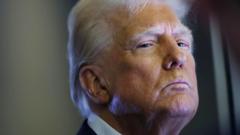On Saturday evening, while traveling from Las Vegas to Miami on Air Force One, President Donald Trump engaged in an impromptu discussion with reporters, reflecting his renewed assertiveness just days after returning to the Oval Office. “We’re getting A-pluses on the work done," he stated, showcasing the optimism that surrounds his administration's early days. This confidence stems from a decisive election victory where Trump swept all swing states, even claiming the popular vote—a first for a Republican in two decades.
During this first week, Trump has undertaken a blitz of executive actions, signing a staggering 26 orders, a number significantly higher than his predecessor, Joe Biden, who signed only nine in his inaugural week. This swift action highlights Trump's intention to rapidly dismantle policies established during the previous administration. The newly reincarnated Trump 2.0 era is marked by the reinstatement of symbols from his previous tenure, including the notorious Diet Coke button and portraits of historical political figures that align with his vision of governance.
The reversal of policies has included controversial decisions, such as pardoning over 1,500 individuals involved in the Capitol riots, signaling his unwillingness to concede defeat to his political enemies. Trump's efforts to rename the Gulf of Mexico as the Gulf of America signify a broader effort to assert control over national narratives and redefine American governance.
Observers note that Trump has learned from prior pitfalls, adopting a more focused and guided approach in his second term. A former official remarked that the current administration seems far better organized compared to the chaotic beginnings of his first term. Learning from previous legal challenges that plagued him, Trump's team appears to be laying a foundation for enduring changes in policy, particularly regarding immigration and border control.
As the new administration sets its agenda, political historians analyze the motivations and implications of Trump's ambitious overhaul. Douglas Brinkley, a presidential historian, characterizes the current political climate as a testament to Trump's unapologetic confidence and potent influence within the Republican Party. As a result, Trump's return might reshape not only his legacy but also the political landscape in America for years to come.
The ambitious agenda of Trump 2.0, coupled with a solidified Republican Congress, indicates a potential shift in governance that could lead to profound implications for U.S. policy both domestically and internationally. As the nation watches closely, Trump's assertive approach may indeed define an era marked by disruption and transformation in the American political arena.
During this first week, Trump has undertaken a blitz of executive actions, signing a staggering 26 orders, a number significantly higher than his predecessor, Joe Biden, who signed only nine in his inaugural week. This swift action highlights Trump's intention to rapidly dismantle policies established during the previous administration. The newly reincarnated Trump 2.0 era is marked by the reinstatement of symbols from his previous tenure, including the notorious Diet Coke button and portraits of historical political figures that align with his vision of governance.
The reversal of policies has included controversial decisions, such as pardoning over 1,500 individuals involved in the Capitol riots, signaling his unwillingness to concede defeat to his political enemies. Trump's efforts to rename the Gulf of Mexico as the Gulf of America signify a broader effort to assert control over national narratives and redefine American governance.
Observers note that Trump has learned from prior pitfalls, adopting a more focused and guided approach in his second term. A former official remarked that the current administration seems far better organized compared to the chaotic beginnings of his first term. Learning from previous legal challenges that plagued him, Trump's team appears to be laying a foundation for enduring changes in policy, particularly regarding immigration and border control.
As the new administration sets its agenda, political historians analyze the motivations and implications of Trump's ambitious overhaul. Douglas Brinkley, a presidential historian, characterizes the current political climate as a testament to Trump's unapologetic confidence and potent influence within the Republican Party. As a result, Trump's return might reshape not only his legacy but also the political landscape in America for years to come.
The ambitious agenda of Trump 2.0, coupled with a solidified Republican Congress, indicates a potential shift in governance that could lead to profound implications for U.S. policy both domestically and internationally. As the nation watches closely, Trump's assertive approach may indeed define an era marked by disruption and transformation in the American political arena.






















